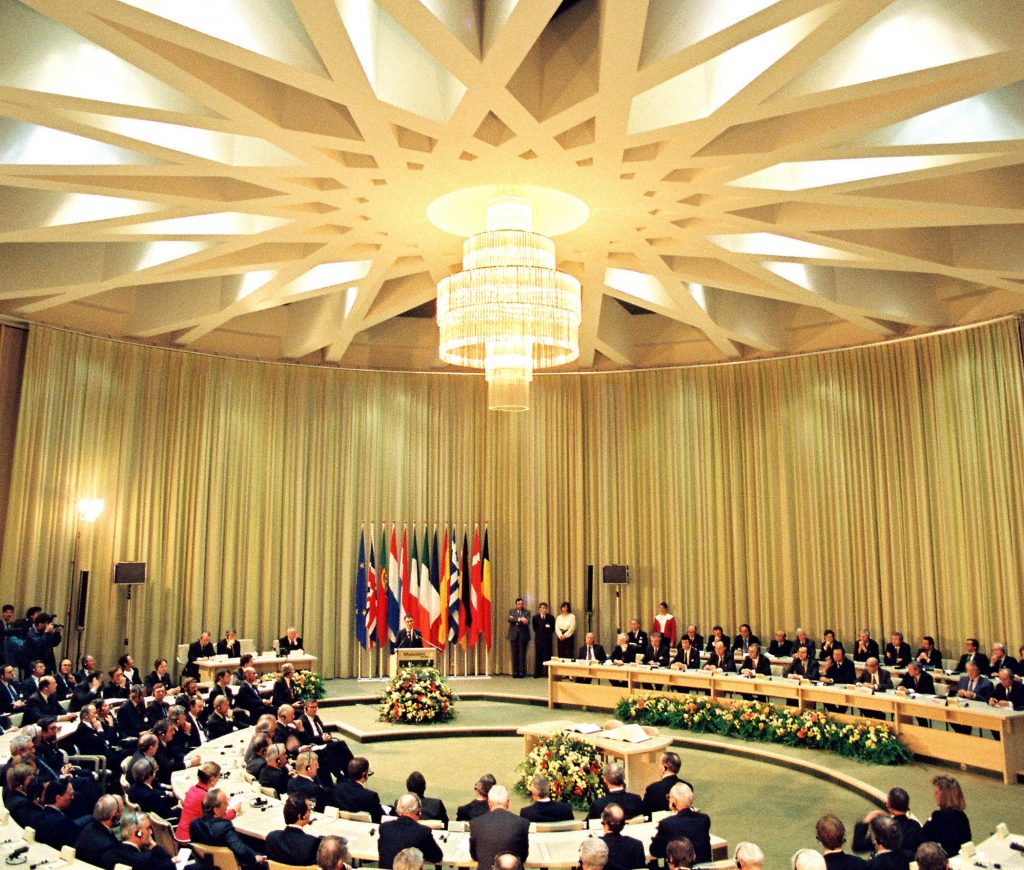The Treaty on European Union (TEU) signed in Maastricht on February 7, 1992 was conceived as an act of refounding the project of European integration.
As the result of numerous compromises, it was supposed to respond to many challenges, including the democratic deficit that threatened the legitimacy of European construction and the role of the EU on the international scene after the fall of the Berlin Wall.
On the political level, the Treaty opens the way to a progressive democratization of decision-making at European level.
On the economic front, it lays the foundations for Economic and Monetary Union (EMU), the weaknesses of which have been debated at length in the context of the eurozone crisis.
In Maastricht, the political elites agreed to widen the Union’s field of action to a series of new areas, most of which are at the heart of national sovereignty, such as economic and social policies, without however allocating new powers to supranational institutions. Since then, European integration has become more politicized and contested. The Treaty marks the start of a new phase – more intergovernmental – due to the increased reluctance of national governments to pursue integration through supranationalization (Bickerton et al 2015).
Some readings from our researchers
On the occasion of the 28th anniversary of the ratification of the Treaty, let’s have a look back on the publications by our IEE affiliated researchers and their analysis on the topic:
- Brack, N. & Costa, O. (2018), How the EU Really Works (2nd ed), Routledge, 330p, ISBN: 9780815370475.
- Brack, N. & Costa, O. (2017), Le fonctionnement de l’Union européenne, Editions de l’Université de Bruxelles, 464p, ISBN: 978-2-8004-1622-9.
- Bribosia, E., Joncheray, N., Navasartian Havani, A. & Weyembergh, A. (2019), L’Europe au Kaléidoscope. Liber Americorum Marianne Dony, 518p, EAN 9782800417080, .
- Coman, R., Fromont, L. & Weyembergh, A. (eds., 2019), Les solidarités européennes: Entre enjeux, tensions et reconfigurations, Bruylant Edition, 436 p, ISBN-10: 2802764985.
- Crespy, A. (2019), L’Europe sociale. Acteurs, politiques, débats, Les Editions de l’Université de Bruxelles, 310 p, ISBN: 978-2-8004-1642-7.
- Dony, M. (2018), Droit de l’Union européenne (7ième ed.), Editions de l’Université de Bruxelles, ISBN 978-2-8004-1631-1, 816 p.
- Grevi, G., Weyembergh, A., Ponjaert, F. & De Waele, J.-M. (2019), Rethinking the European Union and its Global Role from the 20th to the 21st Century. Liber Amicorum Mario Telò, Collection Etudes européennes, 310 p, ISBN: 978-2-8004-1641-0.
- Weyembergh, A. & Telò, M. (eds., 2020), Supranational Governance at Stake – The EU’s External Competences caught between Complexity and Fragmentation (1st ed.), Routledge, 320 p, ISBN: 9780367821203.
- Coman, R. (2020), Configuring the Rule of Law in the EU Polity: Between supranationality and sovereignty, in: Supranational Governance at Stake – The EU’s External Competences caught between Complexity and Fragmentation (eds. Weyembergh, A. & Telò, M., 1st ed.), Routledge.
- Telò, M. & Weyembergh, A. (2020), Supranationality and Sovereignty in an Era of Increasing Complexity and Fragmentation, in: Supranational Governance at Stake – The EU’s External Competences caught between Complexity and Fragmentation (eds. Weyembergh, A. & Telò, M., 1st ed.), Routledge.
- Brack, N., Coman, R. & Crespy, N. (2019), Unpacking old and new conflicts of sovereignty in the European polity, Journal of European Integration 41(7): 817-832.
- Coman, R. & Leconte, C. (2019), Contesting EU authority in the name of European identity: the new clothes of the sovereignty discourse in Central Europe, Journal of European Integration 41(7): 855-870.
- Foret, F. & Markoviti, M. (2019), The EU counter-radicalisation strategy as “business as usual”? How European political routine resists radical religion, Journal of European Integration, 17p.
- Brack, N. Coman, R. & Crespy, A. (2019) Sovereignty conflicts in the European Union, Cahier du Cevipol / Brussels Working Papers, n° 4/2019.




